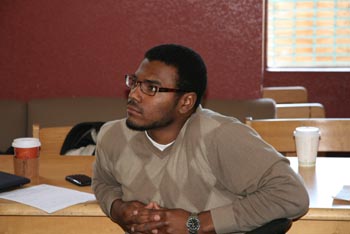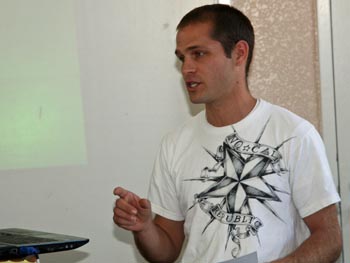Campus News
Student-run Carbon Fund boosts green projects on and off campus
The Carbon Fund Committee has selected nine green-minded projects for funding, ranging from a “green Wharf” project to a regional water use reduction campaign.



In its first year, the student-run Carbon Fund became a major player in campus sustainability efforts, raising $180,000 to reduce UCSC’s carbon footprint.
Now the Carbon Fund has taken another big step forward. This campus-based environmental group’s selection committee has chosen nine staff and student projects for funding this year. Each successful applicant combines “green” philosophy with hard-nosed practicality.
“We’re very happy with the applications,” said Carbon Fund chairman Cameron Fields, an environmental studies/economics double major with a minor in politics. Fields is also a Campus Climate Action intern. “We hope for an even stronger turnout during the next funding round.”
Projects were selected from a pool of 13 applicants. Here are a few of this year’s highlights:
- With help from a $12,000 Carbon Fund grant, undergraduates Grant Hartwell, Gabi Kirk and Lindsey Roark are launching a “Take Back The Tap” pilot program to turn some of UCSC’s drinking fountains into reusable bottle refill stations with push-back spigots similar to the ones used in fast-food restaurant soda fountains. The grant will fund the installation of refill stations at the UCSC Office of Physical Education, Recreation and Sports (OPERS) and several other places on campus, along with a community based-social marketing campaign.
- The undergraduates Winfield Atherton and Lucy Ferneyhough, both part of the Impact Designs: Engineering and Sustainability Through Student Service internship (IDEASS) program, are installing a water-conservation system at Natural Bridges High School/Career Training Center on Swift Street in Santa Cruz. Their project includes a cistern and pipes to capture and channel rainfall to the school’s garden. They expect to finish the project in June. Atherton and Ferneyhough received $8,000 from the Carbon Fund for this project.
- Tiffany Wise-West, a graduate student in the environmental sciences Ph.D. program, is supervising a team that will help make the historic Santa Cruz Municipal Wharf energy self-sufficient. A $15,000 Carbon Fund grant will help Wise-West’s team study the possibilities of wind and solar power on the half-mile-long wharf. A solar panel and wind turbine will be installed on a platform on the Wharf Headquarters roof, along with sensors that monitor wind and solar power. Wise-West recently received an Alumni Association Award at the Graduate Research Symposium for her presentation on this project.
- Undergraduates Marine Richard and Abass Mohamed, both part of the UCSC Green Campus program, are launching projects to make lighting at the West Remote parking lot and the East Field House more energy efficient. The two projects received a total of $29,000.
- An undergraduate-led project called PROPS (Program Recognizing Offices Practicing Sustainability) received $2,415 to help make campus staff offices more ecologically friendly through a certification program. The project includes energy audits, retrofitting light fixtures and power strips, changing faucets, and using eco-friendly paper and printers.
- UCSC Arboretum staff will work with students and conservation groups on a plan to reduce water use throughout the region through educational programs and the sale of drought-tolerant plants. The Arboretum received $10,000 to fund the program.
Each project is community-based, requiring cooperation between students, staff and community members. Stephen McCabe (Cowell, 1977), the UCSC Arboretum’s director of development and research, and curator of succulents, will work closely with students and conservation groups to help the public save water.
McCabe hopes the Arboretum project will save 740,000 gallons of water per year throughout the region, while reducing the consumption of gasoline and other petroleum projects used to deliver and purify water.
Participants will also encourage residents to plant trees efficiently. “It’s great to plant a tree, but if you plant it right under power lines, you have to prune it back with chainsaws for the next 20 years,” McCabe said. “After a while, you consume so much energy that you more than offset the benefits of planting the tree in the first place.”
The project coordinators will work closely with Cameron Fields, Lindsey Roark and John Michael Berndt of the Carbon Fund. Berndt serves as the fund’s student facilitator, while Roark handles outreach and publicity. Roark is also part of the “Take Back the Tap” team.
All recipients were asked to keep the project as transparent as possible by blogging updates about their progress at least once a month.
A Google document will help Fields, Berndt and Roark monitor each team’s progress and measure the total carbon reduction.
The Carbon Fund operates under the auspices of the UCSC Sustainability Office.
It uses money raised by Measure 44, a student-approved ballot initiative that raises money through a $3-per-quarter student fee.
The fee itself is not new; it has been in place since 2006, when students imposed a previous renewable energy ballot measure. Measure 44 simply redirects that money to the carbon fund.
“The great part is that everyone can spare three dollars a quarter so it doesn’t seem that big of a deal and it really has a huge impact,” said Roark, a third-year student majoring in ecology and evolutionary biology.
The Carbon Fund committee is comprised of Patrick Testoni (UCSC Energy Manager), Daniel Press (ENVS department chair), Kate Cunningham (Staff from purchasing that focuses on sustainability), James Barsimantov (ENVS professor of the IDEASS class), Cameron Fields (CUIP and student), Nina Mautner (co-chair Student Environmental Center and student), Ben Oberhand ( Green Campus leader and student), Robert Singleton (SSITE chair and student)